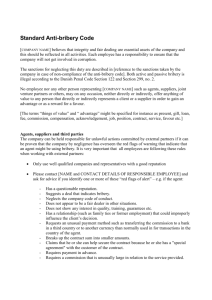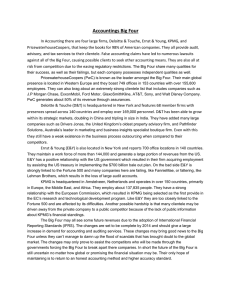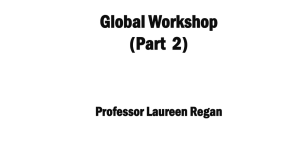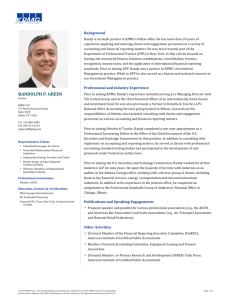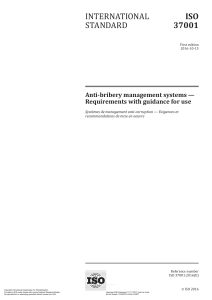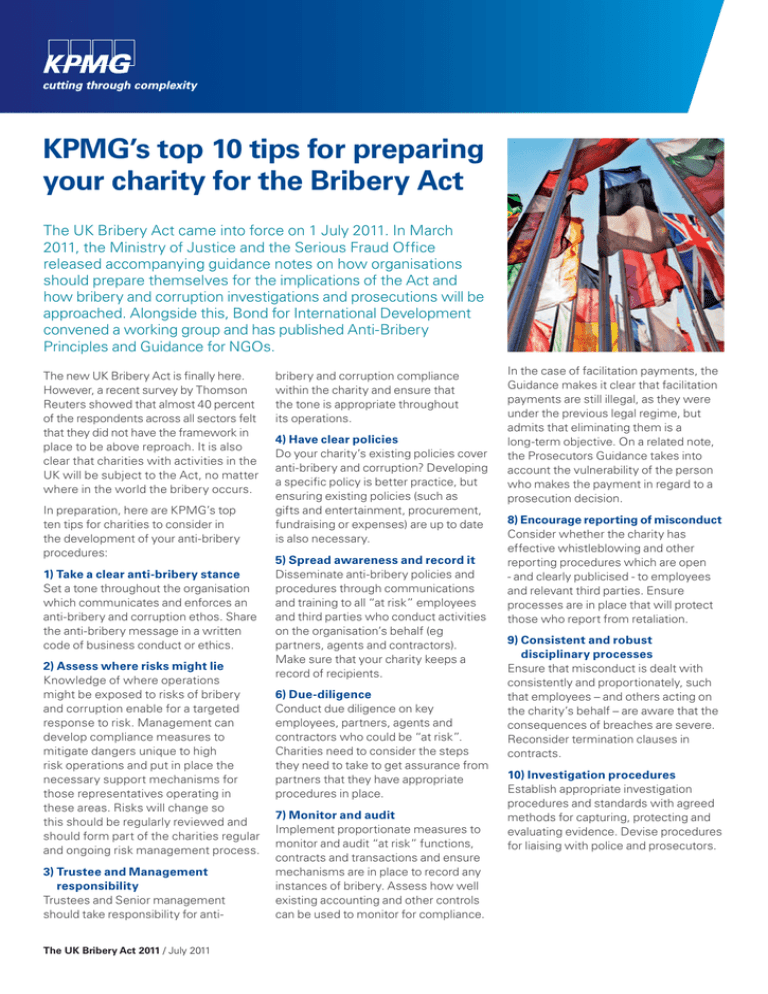
KPMG’s top 10 tips for preparing
your charity for the Bribery Act
The UK Bribery Act came into force on 1 July 2011. In March
2011, the Ministry of Justice and the Serious Fraud Office
released accompanying guidance notes on how organisations
should prepare themselves for the implications of the Act and
how bribery and corruption investigations and prosecutions will be
approached. Alongside this, Bond for International Development
convened a working group and has published Anti-Bribery
Principles and Guidance for NGOs.
The new UK Bribery Act is finally here.
However, a recent survey by Thomson
Reuters showed that almost 40 percent
of the respondents across all sectors felt
that they did not have the framework in
place to be above reproach. It is also
clear that charities with activities in the
UK will be subject to the Act, no matter
where in the world the bribery occurs.
In preparation, here are KPMG’s top
ten tips for charities to consider in
the development of your anti-bribery
procedures:
1) Take a clear anti-bribery stance
Set a tone throughout the organisation
which communicates and enforces an
anti-bribery and corruption ethos. Share
the anti-bribery message in a written
code of business conduct or ethics.
2) Assess where risks might lie
Knowledge of where operations
might be exposed to risks of bribery
and corruption enable for a targeted
response to risk. Management can
develop compliance measures to
mitigate dangers unique to high
risk operations and put in place the
necessary support mechanisms for
those representatives operating in
these areas. Risks will change so
this should be regularly reviewed and
should form part of the charities regular
and ongoing risk management process.
3) Trustee and Management
responsibility
Trustees and Senior management
should take responsibility for antiThe UK Bribery Act 2011 / July 2011
bribery and corruption compliance
within the charity and ensure that
the tone is appropriate throughout
its operations.
4) Have clear policies
Do your charity’s existing policies cover
anti-bribery and corruption? Developing
a specific policy is better practice, but
ensuring existing policies (such as
gifts and entertainment, procurement,
fundraising or expenses) are up to date
is also necessary.
5) Spread awareness and record it
Disseminate anti-bribery policies and
procedures through communications
and training to all “at risk” employees
and third parties who conduct activities
on the organisation’s behalf (eg
partners, agents and contractors).
Make sure that your charity keeps a
record of recipients.
6) Due-diligence
Conduct due diligence on key
employees, partners, agents and
contractors who could be “at risk”.
Charities need to consider the steps
they need to take to get assurance from
partners that they have appropriate
procedures in place.
7) Monitor and audit
Implement proportionate measures to
monitor and audit “at risk” functions,
contracts and transactions and ensure
mechanisms are in place to record any
instances of bribery. Assess how well
existing accounting and other controls
can be used to monitor for compliance.
In the case of facilitation payments, the
Guidance makes it clear that facilitation
payments are still illegal, as they were
under the previous legal regime, but
admits that eliminating them is a
long-term objective. On a related note,
the Prosecutors Guidance takes into
account the vulnerability of the person
who makes the payment in regard to a
prosecution decision.
8) Encourage reporting of misconduct
Consider whether the charity has
effective whistleblowing and other
reporting procedures which are open
- and clearly publicised - to employees
and relevant third parties. Ensure
processes are in place that will protect
those who report from retaliation.
9) Consistent and robust
disciplinary processes
Ensure that misconduct is dealt with
consistently and proportionately, such
that employees – and others acting on
the charity’s behalf – are aware that the
consequences of breaches are severe.
Reconsider termination clauses in
contracts.
10) Investigation procedures
Establish appropriate investigation
procedures and standards with agreed
methods for capturing, protecting and
evaluating evidence. Devise procedures
for liaising with police and prosecutors.
Key responsibilities
Trustees
Senior management
Internal audit
•
Commit to and oversee the
implementation of a policy of
zero tolerance
•
Undertake the risk assessment – pinpoint
areas of high likelihood, low control for
prioritised response
•
Undertake due diligence assessment
of partners, agents and contractors
•
•
Review the risk assessment – should
form part of each organisations overall
and ongoing risk management process
•
Devise, implement and maintain robust
procedures, which are proportionate to
the risks and the size, resources and
complexity of the organisation
Assess adequacy of anti-bribery
procedures
•
Monitoring and evaluation – periodic
review of anti-bribery procedures
should be made and reported as part of
governance and accountability processes
•
Investigate any instances of actual or
potential bribery
•
•
Establish effective communication of
policy and procedures to staff, partners,
contractors and agents
Ensure appropriate training and support
systems in place
Compliance Programme
Based on our work with numerous
organisations from across sectors and
geographies, we have developed the
following detailed framework for
Anti-Bribery and Corruption compliance.
Whilst these principles apply across
organisations, it is important to note that
any compliance programme must be
risk based and proportionate taking into
account where, who, and with whom
an organisation conducts business.
ern
Co al A
mp ud
lia it a
nc nd
e
-A
cti
An ve Pa
aly ym
sis en
t
Hotline a
Pro
Investi
gation
me
Brent McDaniel
Director, Head of Anti-Corruption
T: 020 7311 3516
E: brent.mcdaniel@kpmg.co.uk
ure
Int
oring
g Monit
On-goin aluation
v
and E
dia
tio
n
po
ns
e
Prevention
FCPA
t
Re
Disclos
Marianne Fallon
Partner, Head of Charities
T: 01293 652 196
E: marianne.fallon@kpmg.co.uk
g
tin
tan
bs
Su
tec
tio
n
s
Te
ive
d
an
nt y
me ilit
ce ab
for nt
En ccou
A
ine
dL
an ent
e
v
m
ti
cu age
Exe Man
ABC
Compliance
Programme
Boar
d an
Comm d Audit
ittee
ent
ssessm
l Risk A
Interna
Contact us for more information:
t Controls
S of
De
Other Laws
of Co
nd
Polic uct and
ies
ontrols
un
i
Tra catio
inin n a
nd
g
ce
Code
en
mm
cific C
ss Spe
Proce
ilig
eD
Du
Co
nd Whis
Mechan tleblower
isms
UK Bribery Act
Re
s
OECD
The information contained herein is of a general nature and is not intended to address the circumstances of any particular
individual or entity. Although we endeavour to provide accurate and timely information, there can be no guarantee that such
information is accurate as of the date it is received or that it will continue to be accurate in the future. No one should act on
such information without appropriate professional advice after a thorough examination of the particular situation.
© 2011 KPMG LLP, a UK limited liability partnership, is a subsidiary of KPMG Europe LLP and a member firm of the KPMG
network of independent member firms affiliated with KPMG International Cooperative, a Swiss entity. All rights reserved.
Printed in the United Kingdom.
The KPMG name, logo and “cutting through complexity” are registered trademarks or trademarks of KPMG International.
www.kpmg.co.uk
Designed and produced by KPMG LLP (UK)’s Design Services
RR Donnelley | RRD-257177 I July 2011 I Printed on recycled material

